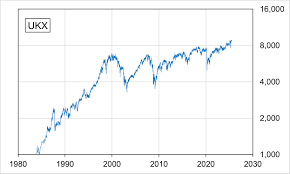
Introduction to the FTSE 100 Index
The FTSE 100 Index, established in 1984, represents the 100 largest companies listed on the London Stock Exchange (LSE) by market capitalisation. As a barometer of the UK’s economic performance, this index plays a crucial role in investment strategies, economic forecasting, and understanding market conditions. Investors and analysts closely monitor movements in the FTSE 100 Index to gauge overall market health, making it a key focus for those involved in finance and economics.
Recent Trends and Performance
As of October 2023, the FTSE 100 Index has shown a remarkable resilience in the face of economic challenges, notably high inflation rates and geopolitical uncertainties. Over the past month, the index demonstrated a steady upward trend, reflecting a growing investor confidence in blue-chip stocks. This recovery can be attributed to several factors, including robust corporate earnings reports and improved consumer sentiment. Notably, major constituents like Unilever and BP have reported better-than-expected profits, positively influencing the index.
The index recently crossed the 7,500 mark, the highest level seen in over a year, signalling potential opportunities for investors. Analysts suggest that the continued rise may be supported by a stabilising political landscape and a recovery in key sectors such as energy and financial services.
Implications for Investors
For investors, the FTSE 100 Index serves as an essential tool for asset allocation and market evaluation. Its performance impacts pension funds, hedge funds, and individual investors alike. As the index includes various sectors such as technology, healthcare, and consumer goods, it allows for diversified investment strategies. Furthermore, trends in the FTSE 100 can indicate broader economic conditions, influencing decisions at both the corporate and consumer levels.
Conclusion and Future Outlook
Looking ahead, the outlook for the FTSE 100 Index remains cautiously optimistic. Economic indicators such as employment rates, consumer spending, and global market trends will be pivotal in determining future movements. With the Bank of England’s stance on interest rates and inflation renowned for its influence on market dynamics, investors are keenly observing these developments. As we head towards the end of the year, it is crucial for stakeholders to stay informed about the factors that may affect the index, ensuring they can navigate the evolving market landscape effectively. Ultimately, understanding the FTSE 100 Index is vital for anyone keen on the pulse of UK economic health and investment opportunities.
You may also like

Understanding Tax: Its Importance and Recent Changes

Current Insights on Shell Share Price
